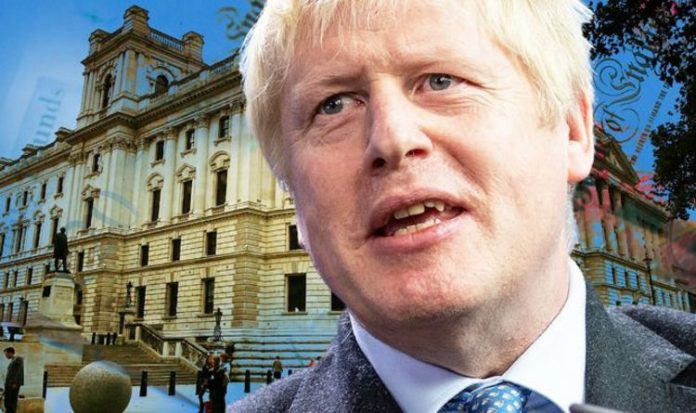Coronavirus has brought large parts of the economy to a standstill, and the Government has had to spend billions to support workers, businesses and the NHS. On July 9, Chancellor of the Exchequer Rishi Sunak delivered an economic update on the next stage of the Government’s plans to rebuild the economy. He announced a package worth up to £30billion, which included plans to protect jobs, help younger workers and encourage spending.
It is not clear how big the final bill will be until after the crisis is over. However, Downing Street will certainly have to borrow unprecedented amounts of money.
According to the Office for Budget Responsibility (OBR), for the current financial year (April 2020 to April 2021), it could be anywhere from £263billion to £391billion.
Before the crisis, the Government was expecting to borrow about £55billion for the whole financial year, but it borrowed £128billion in the first three months alone.
Treasury officials are reportedly pushing for the largest tax rises in a generation to plug the gaping holes in the public finances, in a move being resisted by Downing Street.
The proposed quintuple whammy of tax increases would enable the Exchequer to raise at least £20billion a year, and some could be introduced as early as in the Budget.
While no decision has been made, proposals believed to be under active consideration include aligning capital gains tax (CGT) with income tax, slashing pension tax relief, raising fuel and other duties, the introduction of an online sales tax and a simplification of the inheritance tax system.
Moreover, according to unearthed reports, Prime Minister Boris Johnson might also consider proposing a flat rate of income tax at 30 percent.
Mr Johnson had already laid out the plans in 2013, while he was serving as Mayor of London.
At the time, the old Etonian said everyone should have paid the same income tax and suggested 25p or 30p in the pound.
However, that would mean that income tax would have been halved for those on the top 50p rate earning £150,000 or more.
Mr Johnson raked in almost £500,000 in 2012 and so would have benefited greatly from the proposal himself.
JUST IN: Brexit bonanza: Joe Biden could boost US-UK special relationship
On the other hand, the plans would have had a huge impact on people who paid the 20 percent basic rate, those who currently earned up to £34,370.
His proposals meant someone working a 40-hour week on minimum wage would have been £477 worse off yearly.
Mr Johnson told the Mirror: “A single flat rate of tax at 25 percent or 30 percent could work brilliantly. We need to send a signal to enterprise.
“A flat rate works in some places and I am told it would be ideal for this country.”
He then admitted his scheme would have plunged Britain much further into the red in the short term before boosting the economy in the long run.
He explained: “Revenue would go up as you liberated enterprise.
“People would say ‘wow’ this is the place to do business.”
The General Secretary of the British Trades Union Congress Frances O’Grady hit out Mr Johnson’s proposal, saying: “This would be the mother of all tax cuts for the super-rich and a hefty tax rise for low and middle income families.
DON’T MISS:
Laura Kuenssberg’s warning to Corbyn about John McDonnell exposed [INSIGHT]
Macron ‘following in de Gaulle’s footsteps’ with Brexit stance [ANALYSIS]
Boris Johnson said Britain’s super rich must pay more council tax [REVEALED]
“It is fantasy economics.
“If the Mayor is really interested in a more progressive tax system he should ask George Osborne to reverse his tax cut for millionaires, rather than suggesting vague tax ideas that would cost tens of billions of pounds.”
Former Shadow Treasury Minister Chris Leslie added: “It’s the same old Tories – unfair and just plain wrong.
“Not content with a Tory tax cut for millionaires in April, which will see the top rate slashed from 50p to 45p, Boris now wants to drop their taxes even further and hike them up for people on low incomes.”







